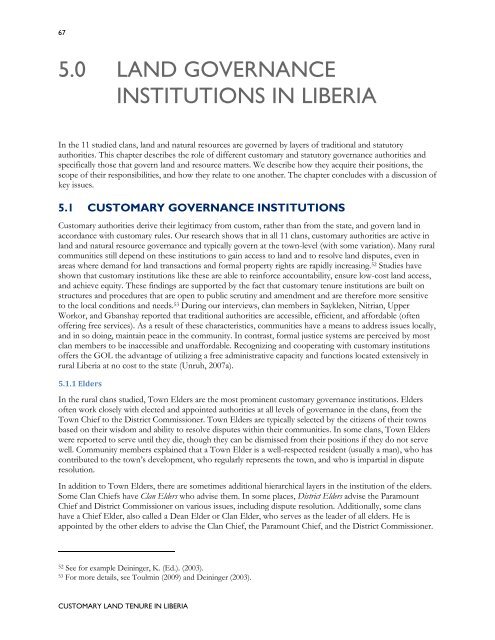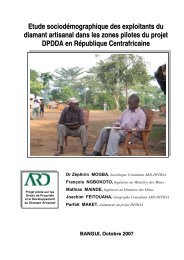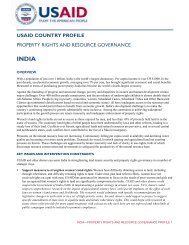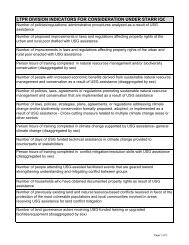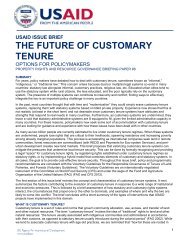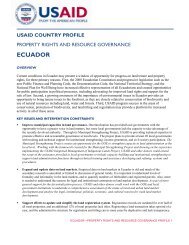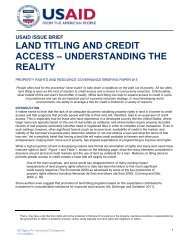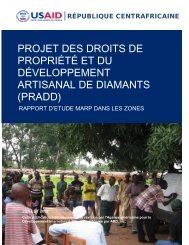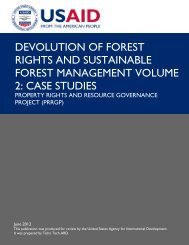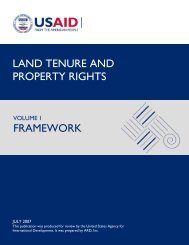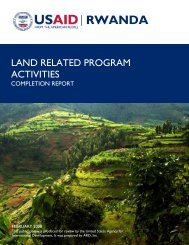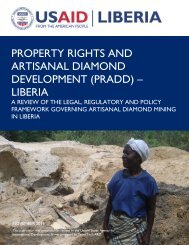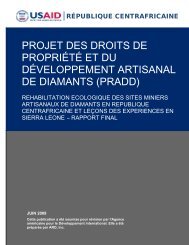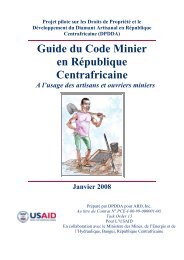Customary Land Tenure in Liberia - Land Tenure and Property ...
Customary Land Tenure in Liberia - Land Tenure and Property ...
Customary Land Tenure in Liberia - Land Tenure and Property ...
Create successful ePaper yourself
Turn your PDF publications into a flip-book with our unique Google optimized e-Paper software.
67<br />
5.0 LAND GOVERNANCE<br />
INSTITUTIONS IN LIBERIA<br />
In the 11 studied clans, l<strong>and</strong> <strong>and</strong> natural resources are governed by layers of traditional <strong>and</strong> statutory<br />
authorities. This chapter describes the role of different customary <strong>and</strong> statutory governance authorities <strong>and</strong><br />
specifically those that govern l<strong>and</strong> <strong>and</strong> resource matters. We describe how they acquire their positions, the<br />
scope of their responsibilities, <strong>and</strong> how they relate to one another. The chapter concludes with a discussion of<br />
key issues.<br />
5.1 CUSTOMARY GOVERNANCE INSTITUTIONS<br />
<strong>Customary</strong> authorities derive their legitimacy from custom, rather than from the state, <strong>and</strong> govern l<strong>and</strong> <strong>in</strong><br />
accordance with customary rules. Our research shows that <strong>in</strong> all 11 clans, customary authorities are active <strong>in</strong><br />
l<strong>and</strong> <strong>and</strong> natural resource governance <strong>and</strong> typically govern at the town-level (with some variation). Many rural<br />
communities still depend on these <strong>in</strong>stitutions to ga<strong>in</strong> access to l<strong>and</strong> <strong>and</strong> to resolve l<strong>and</strong> disputes, even <strong>in</strong><br />
areas where dem<strong>and</strong> for l<strong>and</strong> transactions <strong>and</strong> formal property rights are rapidly <strong>in</strong>creas<strong>in</strong>g. 52 Studies have<br />
shown that customary <strong>in</strong>stitutions like these are able to re<strong>in</strong>force accountability, ensure low-cost l<strong>and</strong> access,<br />
<strong>and</strong> achieve equity. These f<strong>in</strong>d<strong>in</strong>gs are supported by the fact that customary tenure <strong>in</strong>stitutions are built on<br />
structures <strong>and</strong> procedures that are open to public scrut<strong>in</strong>y <strong>and</strong> amendment <strong>and</strong> are therefore more sensitive<br />
to the local conditions <strong>and</strong> needs. 53 Dur<strong>in</strong>g our <strong>in</strong>terviews, clan members <strong>in</strong> Saykleken, Nitrian, Upper<br />
Workor, <strong>and</strong> Gbanshay reported that traditional authorities are accessible, efficient, <strong>and</strong> affordable (often<br />
offer<strong>in</strong>g free services). As a result of these characteristics, communities have a means to address issues locally,<br />
<strong>and</strong> <strong>in</strong> so do<strong>in</strong>g, ma<strong>in</strong>ta<strong>in</strong> peace <strong>in</strong> the community. In contrast, formal justice systems are perceived by most<br />
clan members to be <strong>in</strong>accessible <strong>and</strong> unaffordable. Recogniz<strong>in</strong>g <strong>and</strong> cooperat<strong>in</strong>g with customary <strong>in</strong>stitutions<br />
offers the GOL the advantage of utiliz<strong>in</strong>g a free adm<strong>in</strong>istrative capacity <strong>and</strong> functions located extensively <strong>in</strong><br />
rural <strong>Liberia</strong> at no cost to the state (Unruh, 2007a).<br />
5.1.1 Elders<br />
In the rural clans studied, Town Elders are the most prom<strong>in</strong>ent customary governance <strong>in</strong>stitutions. Elders<br />
often work closely with elected <strong>and</strong> appo<strong>in</strong>ted authorities at all levels of governance <strong>in</strong> the clans, from the<br />
Town Chief to the District Commissioner. Town Elders are typically selected by the citizens of their towns<br />
based on their wisdom <strong>and</strong> ability to resolve disputes with<strong>in</strong> their communities. In some clans, Town Elders<br />
were reported to serve until they die, though they can be dismissed from their positions if they do not serve<br />
well. Community members expla<strong>in</strong>ed that a Town Elder is a well-respected resident (usually a man), who has<br />
contributed to the town‟s development, who regularly represents the town, <strong>and</strong> who is impartial <strong>in</strong> dispute<br />
resolution.<br />
In addition to Town Elders, there are sometimes additional hierarchical layers <strong>in</strong> the <strong>in</strong>stitution of the elders.<br />
Some Clan Chiefs have Clan Elders who advise them. In some places, District Elders advise the Paramount<br />
Chief <strong>and</strong> District Commissioner on various issues, <strong>in</strong>clud<strong>in</strong>g dispute resolution. Additionally, some clans<br />
have a Chief Elder, also called a Dean Elder or Clan Elder, who serves as the leader of all elders. He is<br />
appo<strong>in</strong>ted by the other elders to advise the Clan Chief, the Paramount Chief, <strong>and</strong> the District Commissioner.<br />
52 See for example De<strong>in</strong><strong>in</strong>ger, K. (Ed.). (2003).<br />
53 For more details, see Toulm<strong>in</strong> (2009) <strong>and</strong> De<strong>in</strong><strong>in</strong>ger (2003).<br />
CUSTOMARY LAND TENURE IN LIBERIA


